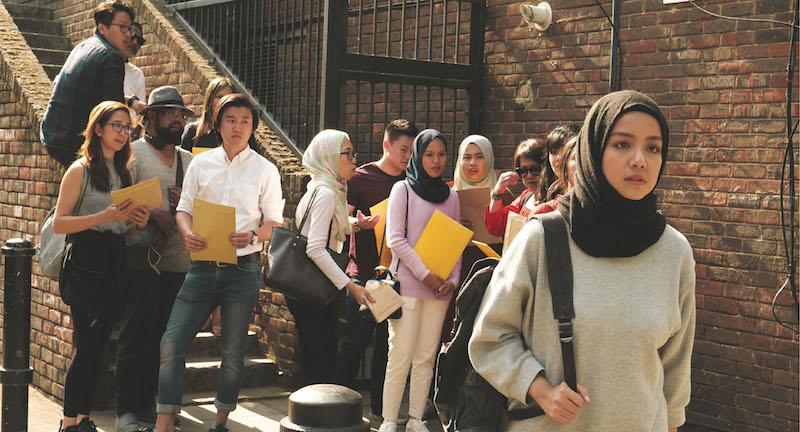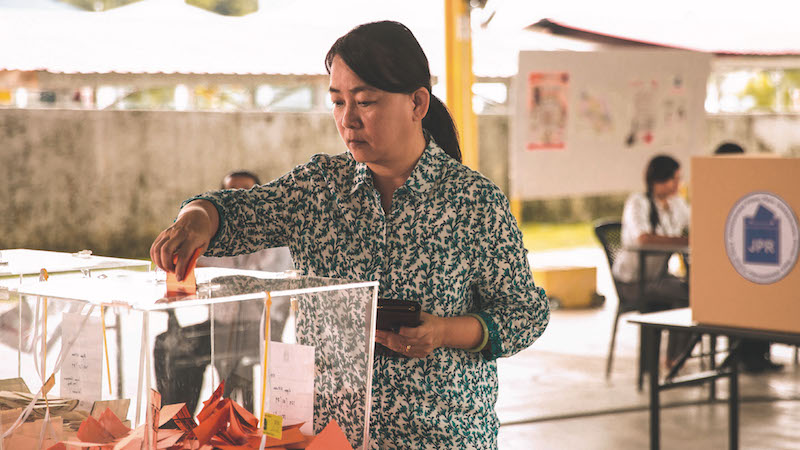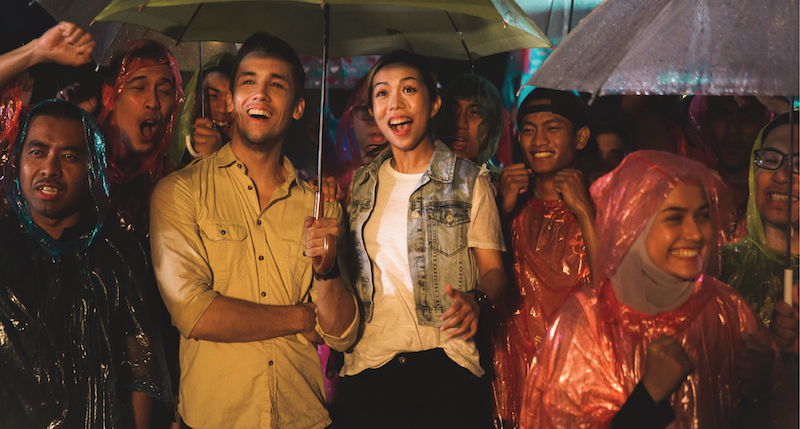
From left: Fred Chong, Saw Teong Him, M S Prem Nath and Nik Amir Mustapha (Photo: Shahrin Yahya/The Edge)
On the morning of May 9, Nik Amir Mustapha got up earlier than usual to go to the polling centre before sending his wife to hers in a different constituency. Meanwhile, M S Prem Nath woke up to an empty house — his entire family, including his sister who was voting for the first time — had already gone out to cast their votes. He quickly left to join them. His expectations were modest, though, after the outcome of the last two general elections, when the change he hoped for failed to materialise. On the other side of town, Saw Teong Hin got an inkling that something in the air was different when he arrived at his centre in Ampang to see long queues, young and old, waiting to mark their ballots.
The personal experiences of the three directors of the film, Rise: Ini Kalilah, are part of the broad narrative of the recent 14th general election. The stories that have since emerged of the watershed moment are anything but common.
It was after the shock results of GE14 that Prodigee Media and WebTVAsia CEO Fred Chong found himself mulling a film based on the events leading up to voting day. “After my last movie, Banglasia, was banned, I stopped making films and turned my focus to growing the digital market with WebTV Asia. But the recent election really inspired me. It was something none of us have gone through before — seeing a new government come into place and watching the old government accept it. As a filmmaker, I thought, wouldn’t it be nice to make a movie about this whole experience?”

But the award-winning producer struggled to come up with the right angle, and pushed the idea to the back of his mind for a couple of weeks. But an Astro Awani documentary he saw about postal voters during GE14 caused him to think of Malaysians closer to home and those who played an important role in ensuring a peaceful transition.
The result is a film with six characters — a businessman, a teacher, a reporter, a student, a Malaysian working in Singapore and a police officer — and six intertwining stories. “These are stories we’ve seen or heard about on social media or through our friends. I just gathered all of them and created their stories as inspired by real life,” says Chong.
Pre-production to completion of filming — which took place in Malaysia, Singapore and London — was done at a rapid pace of just three short months, so that it would be ready for release before Sept 16, Malaysia Day.
Speed was of the essence, Chong emphasises. “I could have taken my time but what’s important is the nation’s sentiments now … I wanted us to have something to recap, to celebrate, at a time when the significance of the story is strongest,” he explains.

To achieve that, he sought out three directors in a first-of-its-kind structure in Malaysian filmmaking. He first approached head director Saw, who most recently directed the opening and closing ceremonies of the 2017 SEA Games. Saw, the director of Puteri Gunung Ledang and You Mean The World To Me, said yes, even though he wondered if it was possible. It was the same for Prem (director of Vere Vazhi Ille) and Nik (Kil, Terbaik Dari Langit and Ilham). Nik quips that his first thought was, “What kind of cartoon movie will this be?” but after Chong explained the film’s outline, his answer was a resounding “yes”.
Saw remarks, “I told Fred, I’ll go on this journey with you. If we don’t try it, we won’t know. And honestly, it has turned out beyond my expectations.”
Chong responds that it was only possible because the right directors, with the calibre to match, came on board, along with a strong local cast that includes Remy Ishak, Mira Filzah, Sangeeta Krishnasamy, Jack Tan, Shashi Tharan and Jenn Chia. They all agreed to be a part of the movie without hesitation.
“I mean, the thought of sloppiness — what with the short time span — was at the back of our minds, and so we were very, very careful not to let the team down. Everybody went beyond themselves. I mean, the production team nearly died. Of course, we are not a multi-million budget production even though we had to double and triple up to make it work, but you’ll be amazed at the scale,” Saw adds confidently.

The team is nevertheless aware that certain groups will see the move as propaganda or as pandering to the government. “Some expect Pakatan Harapan to be printed at the top of the poster,” laughs Prem, but “it is a human story.”
Nik chimes in, “The election was only a setting, a backdrop. It is the spirit of the people we tried to capture, the rakyat, who drove the whole thing.”
One may be forgiven for being sceptical of how to convey such sentiments without going over the top, given past examples of promoting nationalism. But Chong maintains that the actual events surrounding GE14 were far more dramatic than were portrayed in the film, which offers only a microscopic fraction of the bigger picture.
“The biggest task for us was to make these characters real human beings, and not just do-gooders. Each of them is flawed, but their hearts, all of them, are in the right place. If that is contrived, then I guess it is. But I think deep inside, we all have this belief that Malaysians can be better,” Saw says.
And on this theme of striving to be better, Rise breaks new ground in Malaysian filmmaking. Chong deliberately sought out a multi-racial line-up of directors to promote the spirit of muhibbah. It was a practical choice, he says, as he wanted the film to reflect a true and natural image of Malaysia as much as possible.
That meant having actors speaking in their mother tongue as well as a mix of colloquial, real-life everyday language. The directors needed to ensure that each part was not lost in translation.

But Chong decided too that it would be interesting to encourage the directors to work with actors and languages they don’t usually associate with.
“I got to work with a very good Indian actress, Sangeeta, and with Remy Ishak, who I directed in the police officer story, as well as a few other really good actors I was not aware of,” he says.
“It’s also a chance for these actors to be seen by other races and audiences,” Nik chips in. “I know when people see Chinese, Indians, Malays, they may think, ‘Here we go again’, but in this new Malaysia, there’s a more organic sense to this concept.”
“This tasty rojak that we’ve been trying to make, this film, is parallel to how we are made up as a nation. And we’re not trying to tamper it down or oversell it,” Saw stresses.
Prem comments, “How it all comes together is like the film itself. We shot it separately for the most part, but when you watch it, it’s not jarring.” The young director says the freedom they enjoyed in Rise — not to mention the support of the Natural Film Development Corporation Malaysia — marks another first for Malaysian cinema.
One challenge they foresee is trying to persuade a section of the public to watch it. “I mean the large minority that voted for the now opposition,” Nik says unhesitatingly. “I think once they see it, they will be able to relate to it. But it is a case of getting past their prejudice about this film. Like Fred said at our press conference, this is not a political movie — it is a patriotic movie. The title is Rise, and it’s really about how we rise up inside in our own ways and rising to the occasion when the time comes,” says Nik.
“It’s about going out of your comfort zone and doing something, pushing beyond ourselves for something we believe in. It’s about something bigger than you — in this case, a Malaysia for everyone, a Malaysian Malaysia,” Saw sums up.
'Rise: Ini Kalilah' opens Sept 13 in local cinemas.


